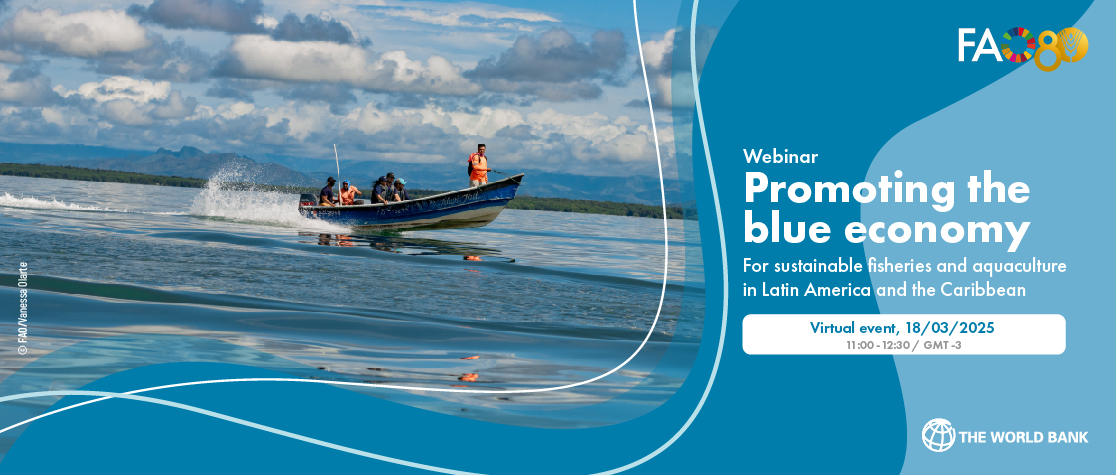Series: Promoting the blue economy for sustainable fisheries and aquaculture in Latin America and the Caribbean
Virtual Event, 18/03/2025

Live broadcast
About the webinar
This webinar, organized by the Food and Agriculture Organization of the United Nations (FAO) and the World Bank, highlights the critical role of the blue economy in driving sustainable development across the region. The event will delve into innovative strategies for protecting ocean resources, fostering resilient coastal communities, and ensuring long-term prosperity for those who depend on these vital ecosystems. Through engaging discussions and expert insights, participants will gain a deeper understanding of the blue economy's potential to support environmental sustainability and promote economic growth particularly in the context of sustainable fisheries and aquaculture.
Speakers:
- Harrison Charo Karisa, Senior Fisheries Specialist (Aquaculture) at the World Bank Group, the United States of America.
- Nicolas Desramaut, Senior Environmental Engineer at The World Bank - Latin America and the Caribbean, Jamaica
- Dayne Buddo, Regional Project Coordinator, Belize
- Manuela Erazo, National Coordinator GEF Proyect, FAO-Chile
- Natalia Raissa Huykman, Responsible of Environment and Natural Resources, Programmes,, FAO-Argentina
Resource persons:
- Javier Villanueva García-Benítez, Senior Fisheries and Aquaculture Officer, FAO Regional Office for Latin America and the Caribbean.
- José Aguilar-Manjarrez, Aquaculture Officer, FAO Regional Office for Latin America and the Caribbean
- Martina Salvo de Oliveira, Moderator, Communication specialist, FAO Regional Office for Latin America and the Caribbean.
About the series
The FAO and the World Bank promote the Blue Transformation and the Blue Economy as a key strategy to transform aquatic food systems.
The adoption of the Blue Economy is crucial to ensure the sustainable use of ocean resources, driving economic growth, job creation, and improved livelihoods, while preserving the health of oceans, seas, and coastal regions. To achieve this, efficient management is encouraged, driven by innovation and multisectoral, integrated collaboration among different sectors.
The FAO's Blue Transformation initiative plays an essential role in expanding aquatic food systems, strengthening their contribution to more sustainable production, better nutrition, environmental conservation, and improved quality of life, especially for communities dependent on fisheries and aquaculture. This approach promotes responsible environmental management and fosters inclusive economic growth.
This seminar is the first in a series of virtual meetings planned for the 2025-2026 biennium, which will highlight the crucial role of Blue Transformation and the Blue Economy in building a sustainable future for aquatic food systems.
Key messages
The key messages of the Blue Economy revolve around the sustainable use of ocean and marine resources to promote economic growth, improve livelihoods, and preserve the health of ocean ecosystems. Key points include:
- Sustainability: Managing ocean resources responsibly, including fisheries, aquaculture, and tourism.
- Economic Growth: Promoting industries like renewable energy, sustainable aquaculture, and shipping.
- Ecosystem Conservation: Protecting marine biodiversity, supporting climate regulation, and ensuring responsible aquaculture practices.
- Climate Mitigation: Oceans help absorb CO2 and build climate resilience.
- Inclusive Growth: Creating equitable opportunities for coastal and island communities, including small-scale fishers and aquaculture farmers.
- Innovation: Using new technologies for sustainable ocean activities, such as advanced aquaculture techniques.
- International Cooperation: Addressing global challenges like pollution and illegal fishing.
- Economic Diversification: Fostering growth in sectors like renewable energy and eco-tourism.
